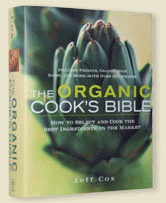How to Find Organic Gardening Products Online
 Gardening season is here, and if you want an organic garden, you won’t need to buy a lot of expensive, toxic chemicals. But there are some items you’ll need to make your organic garden thrive, such as weed barrier cloth instead of herbicides; ways to deal with garden pests like gophers, deer, and rabbits, and perhaps beneficial insects to release.
Gardening season is here, and if you want an organic garden, you won’t need to buy a lot of expensive, toxic chemicals. But there are some items you’ll need to make your organic garden thrive, such as weed barrier cloth instead of herbicides; ways to deal with garden pests like gophers, deer, and rabbits, and perhaps beneficial insects to release.
There’s always Google or Bing, but a better way might be to visit www.OrganicControl.com. This long-time business, operating now for 35 years, covers the field, from beneficial insects to safe and organic insect controls, to products that repel garden-damaging animals, to mason bees that help pollinate your crops, to organic soil amendments, and much more. In addition, there’s a lot you can learn about organic gardening at their site.
Organic Control also has a Facebook page, where you can interact with the folks at the company, ask questions, and get answers. Check them out at www.Facebook.com/OrganicControl.
This company also sells products relating to organic hydroponic growing, a fast-growing field that supplies retailers like Whole Foods with organically-grown vegetables year around.
***
On April 26th of this year, The New York Times carried an editorial entitled, “Hiding the Truth About Factory Farms.” It’s such an important topic that I’d like you to read what the Times had to say:
“A supermarket shopper buying hamburger, eggs, or milk has every reason, and every right, to wonder how they were produced. The answer, in industrial agriculture, is ‘behind closed doors,’ and that’s how the industry wants to keep it. In at least three states—Iowa, Florida, and Minnesota—legislation is moving ahead that would make undercover investigations of factory farms, especially filming and photography, a crime. The legislation has only one purpose: to hide factory farming conditions from a public that is beginning to think seriously about animal rights and the way food is produced.
“These bills share common features. Their definition of agriculture is overly broad; they include puppy mills, for instance. They treat undercover investigators and whistle-blowers as if they were ‘agro-terrorists,’ determined to harm livestock or damage facilities. They would criminalize reporting on crop production as well. And they are supported by the big guns of industrial agriculture: Monsanto, the Farm Bureau, the associations that represent pork producers, dairy farmers, and cattlemen, as well as poultry, soybean, and corn growers.
“Exposing the workings of the livestock industry has been an undercover activity since Upton Sinclair’s day. Nearly every major improvement in the welfare of agricultural animals, as well as some notable improvements in food safety, has come about because someone exposed the conditions in which they live and die. Factory farming confines animals in highly crowded, unnatural and often unsanitary conditions. We need to know more about what goes on behind those closed doors, not less.”
Great editorial. Good for The New York Times. And the editorial writer didn’t even mention that the Constitution expressly prohibits laws limiting freedom of the press. Laws criminalizing investigative journalism, whether words or pictures, are simply unconstitutional. Times food writer Mark Bittman, for whom I have a great deal of respect, addressed the same topic the day after the editorial appeared and wrote, “Minnesota’s ‘ag-gag’ law would seek to punish not only photographers and videographers, but those who distribute their work, which means organizations like the Humane Society of the United States and Mercy for Animals.” The law is so sweeping, says Nathan Runkle, executive director of Mercy for Animals, “that if you took a picture of a dog at a pet shop and texted it to someone, that could be a crime.”
Thirty years ago, when I was Director of Electronic Publishing at Rodale (I must have been one of the first directors of electronic publishing at any publishing house in the world), I wandered into the offices of The New Farm magazine, a Rodale publication about real-life organic farming. It had occurred to me that the cruel factory farming techniques used in the production of our meat, eggs, and milk animals was totally antithetical to the spirit of organic agriculture, and that one of the tenets of organic farming should be the humane treatment of farm animals. I suggested this to the editors—and they laughed at me. “You don’t understand farmers,” they said. “Farmers don’t care about babying their animals. They care about their bottom line.”
Well, now it’s 30 years later and the humane treatment of animals has been added to the tenets of organic farming–not because of me, but because of you, the consumers of organic meat, eggs, and milk who have demanded it. While unspeakable cruelties go on at conventional factory farms, organic farmers have become far less cynical in the past few decades and have made humane treatment of animals part of what it means to be organic. Because organic farmers take better care of their animals, we all become more human.
Now do you see who’s behind the push to make it a crime to take pictures of factory farms?












